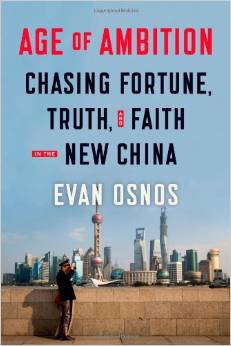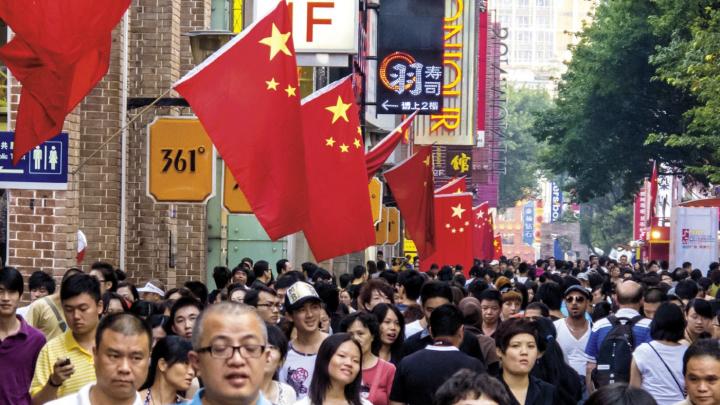Recent months have brought so many reasons to worry about China’s rise: rapidly expanding military capabilities, an increasingly assertive foreign policy, deepening tensions with regional neighbors, and a new leadership that as one of its first acts pledged to fight the “perils” of constitutionalism, civil society, and “universal values”—the favored official euphemism for human rights. The list goes on and on. In the current climate, even the most ostensibly benign aspects of China’s rise—the phoenix-like rebirth of cities like Shanghai and Beijing, the dazzlingly futuristic public infrastructure, the lifting out of poverty of tens or even hundreds of millions of people—take on an almost overwhelming, intimidating feel.
Perhaps it has something to do with the scale of it all, or maybe even the tempo. But for most observers, the real problem lies in the politics. Beijing’s official line is that the “Chinese Dream” is first and foremost about national “rejuvenation” (中国大复兴) and the development of “comprehensive national power” (综合国力). Upon hearing this, one could be forgiven for treating all of China’s recent achievements as merely vehicles for enhanced Communist Party power, and evidence of the ongoing subordination of the citizen to the state.
But in his beautifully written Age of Ambition: Chasing Fortune, Truth, and Faith in the New China, Evan Osnos ’98 provides a strikingly different and decidedly more nuanced account. Osnos, a Beijing-based journalist from 2005 to 2013, and a staff writer for The New Yorker since 2008, is anything but naïve about Chinese authoritarianism. Over the years he has reported eloquently on individuals who, wittingly or not, found themselves on the receiving end of the most brutal and crude forms of Chinese state oppression: people like currently jailed Nobel Peace Prize winner Liu Xiaobo and the previously imprisoned blind human-rights activist Chen Guangcheng (now living in de facto exile in the United States).

Even in relating these most heart-wrenching accounts, Osnos argues that China’s contemporary narrative entails something far more complex than just the crushing of the individual by the state. For Osnos, the situation is in some ways almost the opposite. In his telling, hyperbolic growth has created a sort of national canvas upon which millions of Chinese citizens are feverishly defining their own destinies, and doing so in ways at once wildly diverse and jarringly discordant. From this perspective, the country’s “rejuvenation” becomes less about national power and unity of mission than about personal self-transformation, and self-transformation in as many variants as there are Chinese citizens. “The Party,” Osnos writes, “had always prided itself on articulating the ‘central melody’ of Chinese life, but as the years passed, the Party’s rendition of that melody seemed increasingly out of tune with the cacophony and improvisation striking up all around it.” China, in his words, is now a “chorus of soloists,” a vessel not for a single collective dream, but for many different individual dreams—few of which fit neatly into a single box, and many of which are in tension with one another. Indeed, as he argues, perhaps the only thing unifying them is the raw, absolutely unbridled ambition with which they are pursued.
Followers of the contemporary Chinese scene will meet some familiar characters in Age of Ambition: world-renowned dissident artist Ai Weiwei, former World Bank chief economist Justin Lin, Internet blogger-cum-race-car-driver Han Han, journalist Hu Shuli, and the aforementioned Liu Xiaobo and Chen Guangcheng. Public figures one and all, some achieved fame by resisting the Chinese state, others by accommodating it.
But the most compelling accounts in Age of Ambition involve neither politics nor fame, but instead the extraordinary experiences of absolutely ordinary citizens. One, appearing early in the book, involves “Michael” Zhang, a coal-miner’s son determined to realize a fortune by inventing a new approach to English study. “Inventing” is perhaps too strong a word, for what Michael really was doing was copying (and hoping to one-up) the “Crazy English” model made famous in China by Li Yang, a hugely successful businessman who used language training as a platform for Oprah-like self-help sessions (for paying participants) and bountiful wealth generation (for himself). Whether Michael can prove successful with his own version is anybody’s guess. That he still lives in his parents’ ramshackle apartment, and appears armed only with an endless stream of aphorisms(“The past does not equal the future.” “Believe in yourself.” “Create Miracles.”) does not bode well. But it is the sheer ambition of it all—the unwavering determination to strive for the seemingly unachievable, and the continual bouncing back despite failure after failure—that is at once mind-boggling and familiar to anybody who has spent time in contemporary China. The party may control the symphonic melody, but Chinese society follows its own beat.
An equally compelling account of Beijing street sweeper Qi Xiangfu appears at the very end of the book. In urban China, few jobs rank lower than his. Dressed in his orange overalls and speaking the Southern-inflected Mandarin that instantly marks him as an outsider, Qi is on one level indistinguishable from any number of migrants who perform this lousiest of jobs in the nation’s capital. To the average Beijing resident, he would hardly be worth a moment’s attention. Yet, as it turns out, this lowly street sweeper happens also to be a poet—not just the self-described kind, but one who has attained widespread renown as host of an online poetry forum and winner of various poetry competitions. Street sweeper by day, “Super King of Chinese Couplets” by night, Qi has achieved self-actualization in the very domain that outsiders tend to associate only with state suppression and censorship, the Chinese internet.
In Age of Ambition, Evan Osnos is careful to let people like Qi carry the narrative. Rather than forcing a single interpretation upon the reader, he offers many different possibilities, acknowledging just how hard it is even for the Chinese themselves to understand what’s going on in their contemporary environment.
But among the many themes and insights that make Age of Ambition such an absolute must-read, one in particular gives pause for thought. As so many of Osnos’s profiles underscore, there is so much more to China today than the politics. Of course, the Chinese government, as it strives to drown out discordant voices with political hokum and its own official orthodoxy, would have us think otherwise. And foreign observers, too (albeit in a very different manner), would have us think otherwise as they project onto these discordant voices political motivations having more to do with the yearnings of the West than anything actually going on in China.
What Osnos relates with such clarity, however, is that among the myriad acts of self-transformation unfolding in China today, many—including those of Qi Xiangfu or Michael Zhang—display utter indifference toward the state, the Communist Party, and every other official articulator of the “Chinese Dream.” The party state may control the symphonic melody, but Chinese society is grooving to a decidedly different beat. Today’s China is less martial music than Miles Davis. And that, in a sense, is why the possibilities for China’s rise truly are bound only by the limits of human imagination…or ambition.








